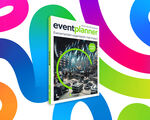I bet you’d agree that the only thing worse than stress is boredom. But what do you do when your workday (and nights and weekends, since you are, after all, an event professional) combines them both?
How do you stay sane when you’re trying to juggle between hours of interminable boring tasks, such as updating Excel spreadsheets with your attendees’ networking preferences, and dealing with high-intensity situations, such as the speaker’s flight delay? Although being an event professional can be very rewarding (at the end, after you’ve saved the day), a big part of the job is spent between highly stressful situations and, for some of us, complete boredom.
So how can you solve this problem and actually start enjoying event management? How about changing it up and handling the planning logistics in a more innovative way? “Is this even possible?” you might be wondering. After all, you’ve spent so many years doing the same thing, using the same old methodologies, you might believe there’s no place for innovation.
Yes, you tried to keep up with the world and adopted an event mobile solution, but you’re still using Google Forms to register and monitor the attendees. Moreover, you may believe that changing how you monitor event logistics usually involves a ton of effort, since you have to completely reinvent how you plan events.
Well, let’s not be so pessimistic. Actually, introducing a bit of innovation in event management will save you a great deal of stress and reduce your boredom considerably. And it’s really not that difficult, since many of the new solutions are automated.
The only thing you’ll “waste” is some time on learning, but considering all the benefits, it’s an investment on future success. So how do you get innovative with event logistics? Here are some ideas that might help you:
Idea #1. Try shared economy-based tools
Spending too much time on arranging transportation and accommodations for your attendees? How about giving them some more autonomy while offering some fast, easy-to-use tools? Thanks to businesses like Airbnb and Uber, the shared economy concept has taken off, and now many cities and countries offer websites and apps to assist attendees with travel needs.
For example, you could talk about the upcoming event with local companies that provide shared cars, bikes, or houses, and maybe even get a discount for their services. Subsequently, you can send your attendees transportation and lodging services information and encourage them to handle their own arrangements.
Idea #2. Opt-in for complete automatization
Getting innovative about event logistics means getting smart about automation. This is a big one. Can you imagine how much you’d be saving, in terms of time and resources, if you planned your event using management platform or software instead of handling everything manually?
You could start by digitizing some of the logistics, such as the registration procedure and generating invoices. After you get more comfortable with “delegating” your tasks to smart algorithms and tools, you’ll want more and, probably make the transition to an all-inclusive event management system.
Idea #3. Set up a blockchain-based payment system
This is something new, but it’s getting more and more traction in the events industry. There are blockchain companies that are reselling tickets to big concerts and events. To ensure the trustworthiness and safety of these transactions (making sure that the seller won’t provide false tickets, for example), these brands are offering new solutions.
If you want to get truly innovative, you can allow attendees to pay using their cryptocurrency wallets, which gives them more options over how to pay.
Idea #4. Clone new event parameters instead of creating one from scratch
Depending on which technology or digital solution you decided to use, there are plenty of systems that let you simply copy the planning parameters (the registration form, the email campaign characteristics, the payment protocol, etc.) when creating a new event.
The only thing you’ll need to do is to adapt these parameters and information to the new circumstances, changing or updating what’s necessary.
Idea #5. Make good use of smart objects
Planning a big event and not sure how to manage the attendee check-in procedure? Speed up the process significantly by using RFID badges.
This greatly simplifies the process, because instead of waiting in long lines that move at a turtle’s pace, attendees enter the event area with just a simple slide of the badge over the check-in portal.
Wrap-up
We all know that planning an event imposes a vast variety of logistic processes and challenges, and in some cases the solutions aren’t so obvious. This happens mostly because we are accustomed to solving issues using the same old methods, which aren’t usually outstanding, time-efficient, or helpful. This can cause tons of stress and even boredom. To keep this from happening, it’s time to get innovative and develop a new approach to handling the event logistics.








I need to know what algorithms and tools software or training I can have to set smooth logistics.